DAY 154: MESSIANIC CHECKPOINT: THE GOSPEL OF MARK
Mark 1 & 2; Psalm 11
IMMEDIATELY
Prior to this year, when asked which of the four Gospels was my personal favorite, I would have answered the Gospel according to St. Mark. There’s an intensity and a drive about the narrative that seems to jump off the pages, summed up in the word: immediately. In today’s two chapters, think about how often that word comes up. You can almost imagine Mark is transcribing St. Peter’s proclamation of the Gospel to the first people he was sent to share this good news with – which is one theory of how this Gospel was formed – that Mark would’ve been accompanying St. Peter as he preached.
There’s this breathlessness and excitement… there’s little reflection or editorializing contained in these pages. For St. Mark, Jesus’ words and actions speak for themselves. And there’s little time to waste – there’s an urgency to fulfilling Jesus’ command to share this good news to the ends of the earth. It reminds me a few years ago an alumni from Montclair State University (where I’ve been blessed to serve for now 14 years) performed a one-man “performance” where he literally dramatically proclaimed the entirety of Mark. A few small props and his heartfelt delivery were all that he needed to for this mesmerizing presentation.
As we take another break from the Old Testament to jump into the Gospel of Mark, it will be interesting to read you’re perspectives, especially if this is your first time hearing or reading this Gospel straight through (as we did with John). For some this will be revelatory to see how there’s such differences from the different writers, yet the beauty and centrality of both – Jesus Christ – shines through them both (or all four of them for that matter).
Oh, and I still love St. Mark’s Gospel – it hasn’t lost any “favor” (I’ve just grown to love and appreciate the others for different reasons)
DAY 155: Mark 3 & 4; Psalm 20
WHO IS THIS
As Fr. Mike mentioned in his pre-Messianic checkpoint conversation with Jeff Cavins (the bonus podcast yesterday) a question that comes up for a lot of people in delving into the Gospels is the so-called “messianic secret.” Where Jesus performs a miracle, a healing, an exorcism and strictly orders the recipients or even the demons he’s casting out to not go and tell people that He is the Son of God. (I had to laugh at Jeff Cavins mentioning that in the past he wondered if this was Jesus using reverse psychology – that was something I had half jokingly thought of in the past as well)
There’s a lot of theological reasons behind that, but one of the essential ones is something that we’ll hear in a few days, when Jesus asks the apostles the question “Who do you say that I am?” After they’ve encountered Him, followed Him, witnessed all that He says and does – the decision for every soul is not to recite what others have said, but rather what they believe.
That came to mind at the end of Chapter 4 – one of my favorite passages in the entire Gospel of Mark: “Jesus calms a storm on the sea.” As they’re crossing at night, the storm picks up and Jesus is sound asleep as they cry out to him “do you not care if we perish?” It’s a raw moment of raw feeling and emotion. They’ve witnessed feats and inexplicable things done at His hand and His word – yet, now as they are scared, fearful, angry – they kind of lash out. Jesus calmly answers them and immediately (see what I did there?) He says “Peace! Be still” and it happens. It’s then that they say “Who then is this that even wind and sea obey Him?”
Jesus is right before them – as He has been all along. He’s revealed Himself in numerous noteworthy ways already, yet, in some ways they’re still confused. For them, it’s not a secret, yet it’s interesting to note that they’re not quite ready to profess who Jesus truly is… That journey from knowing about to knowing – that journey from knowing something in the head to the heart can be the longest for anyone to make.
PS – Here’s a longer talk I gave on this chapter for our 40 Hour Devotion this past October:
DAY 156: Mark 5 & 6 Psalm 21
NO ONE ESCAPES HIS NOTICE
It’s hard to digest these chapters of Mark, isn’t it? I mean in two chapters we have noteworthy things like Jesus being rejected by his hometown crowd; the horrific death of John the Baptist; His walking on the sea… You kind of miss John’s extensive, poetic writings that gave you a chance to catch your breath and really reflect. But the beauty of Mark though is again, the energy. Imagining him (or more likely, St. Peter) laying out the case why you need to know and believe and follow Jesus Christ yourself.
And one of the reasons for that is all that happens around those noteworthy events. Think about what we just heard (or read): Jesus is constantly attending, noticing, responding to people in need. Whether it’s a crowd of 5,000 who are hungry – a man who had been possessed, tormented for decades and isolated from the world – the young daughter of Jairus – or a woman whose bold faith knows, she just knows if she just touches Jesus’ cloak, she can be healed. We get the overwhelming testimony of people who knew and trusted that Jesus is Lord – that our God can move mountains.
But even more important that He desires to do that for everyone.
No prayer is not heard and answered… No person, no need escapes His notice.
DAY 157: Mark 7 & 8; Psalm 23
TAMING & TRAINING
Someone joked with me that if Fr. Mike’s go to phrase from the first five months that we’ve journeying through the bible was “man oh man” – one of mine was/is “tame and train.” That came up a lot in trying to explain the progression that we might have recognized for the Jewish people as they were moving out of the ancient world with some really hard to understand behaviors and attitudes. We would see some movement, some correction on the part of the people but most definitely not at the point of understanding we would have in 2021 with a whole list of important issues equality and justice just to name two. On those occasions, we reflected on the reality that the people themselves were being “tamed and trained” to have a different world view from the other cultures, kingdoms and civilizations o.f that time and place in to becoming God’s chosen people.
Reading these chapters of Mark though, we see that “taming and training” continuing with God become man, Jesus’ teaching. The “tradition of the elders” coming from the Mosaic law and tradition were being followed with military like precision. Yet when it came to the commandments, like honoring your Mother and Father, some of these same people took an incredibly loose view of what that meant. You can hear the justifications and qualifications “what exactly does honoring mean? Technically we’re not dishonoring them if we don’t do this or that…”
Jesus inisn’t dismissing those rituals. There’s reasons for them, there’s meaning behind them, there’s tradition that is being maintained with their ancestors – all of which are important. But when that’s been the focus while these other commandments are being treated so casually – when we’re worrying about pots and pans and not our parents – who is truly being honored? Jesus is expanding his listeners visions to recognize that these other matters are more complex and challenging. Because the heart of the 10 commandments isn’t about controlling behaviors but rather gets to the roots of temptations and sins (the list Jesus itemizes in chapter 7, verses 21 -23). In Jesus, God’s work of taming and training shifts – and continues in our day, our age, and more importantly, our hearts.
DAY 158: Mark 9 & 10; Psalm
CASTING OUT UNBELIEF – PRAYER & FASTING
Fr Mike seems to be doing a pretty thorough and extensive commentary on the chapters of Mark (for those of you paying attention, yesterday’s 28 min podcast was 10 min of the readings and 18 of Fr Mike pointing things out) – which he does a masterful job of highlighting so much that I don’t want to be redundant or repetitive. So in looking at today’s Gospel readings something popped up that is near and dear to my heart that I thought I would share.
In Mark 9: 29 at the end of another exorcism (there’s quite a lot in Mark if you’ve noticed… a topic for another day) which the disciples were unable to accomplish themselves Jesus tells them “this kind cannot be driven out by anything but prayer and fasting.” Not to get lost in a theological debate among biblical scholars – those of you reading other translations of the Bible it might omit “and fasting.” Suffice it to say that there are ancient manuscripts that contain “and fasting” and those that don’t. Personally I believe it belongs there. And it’s something we need to focus on.
Not because you’re being sent out to exorcize demons in other people. But as a spiritual practice to exorcize demons in our own lives. The reason that Jesus is emphasizing the importance of the two practices of prayer and fasting is that in order to defeat the devil we need to connect ourselves more tightly to God (prayer) – and one way of intensifying that prayer is when we’re offering a sacrifice (fasting).
If you talk to professors who have to lecture classrooms, lawyers trying to win a case in court, marketing professionals trying to create an ad campaign- they have all been frustrated by our modern era – that with so much premium being on being entertained, the immediacy and availability for us to distract ourselves and shorter attention spans. That unfortunately has spilled into our spiritual lives as well.
We can point to a whole list of examples especially in the “First World” nations: would a Church even imagine not having air-conditioning? How many parishes have followed other denominations where liturgies are becoming productions with uplifting messages and moving music with the emphasis on catering to people’s preferences? Even in terms of preaching, there’s been this move towards inspiring and motivating people rather than challenging them.
Yet that’s not worship. And it’s hard to imagine that’s in keeping with Jesus’ call for His followers to “deny himself and take up his cross and follow me.” Jesus in these chapters is clearly linking prayer and sacrifice together. By fasting, we create a physical emptiness as a way of reminding us of the more important spiritual needs that only God can feed.
For the man whose son is tormented by a demon who goes to Jesus but undermines his faith with the line “if you can do anything…” uttering one of the most relatable prayers “I believe, help my unbelief” (Mark 9: 22-24) there’s more than one demon affecting that family. You get the sense that as the father asked him to “do anything” that he has relegated prayer and going to Jesus alongside any other “miracle worker” of that day and age.
Jesus wants to bring healing, and wants to answer our prayers. Fasting is one way to purify our hearts, our intentions and sincerity.
DAY 159: Mark 11-12; Psalm 67
FIG TREE
If you follow me on social media, you may have seen about a week ago my posting that on the anniversary of my ordination to the priesthood I received a mysterious gift in the mail: a fig tree. Mysterious because 1 – there was no indication of who it was from and 2 – there was no card or explanation of the meaning behind it. The curiosity factor had my mind going in a lot of different directions. But one brought me to Chapter 11 of Mark’s Gospel, which coincidently had been the reading the day before I received it. Being Italian I wondered if it was meant as a curse directed at me 🙂 (well half-joking…)
In all seriousness though, as we enter into the Holy Week chapters of Mark’s gospel, contained right after Jesus’ triumphal entry on Palm Sunday we read this very curious section of Jesus doing something seemingly very un-Jesus-y. Mark tells us Jesus was hungry, sees a fig tree that doesn’t have any fruit on it and He “curses it.” Five verses (and a day) later, the Fig tree is completely withered away to its roots. Somewhere the people for the ethical treatment of trees are upset. But Mark shares this story as bookends to what happens in between. One of the pivotal moments that will unsettle the Jewish authorities, and arguably be the final straw for them to conspire to crucify Jesus. What was that? The cleansing of the temple when Jesus knocked over tables and drove the money changers out who were defiling this sacred place.
Unlike John’s Gospel that contains so much rich, poetic imagery without explanation, Mark is presenting this to highlight what has just happened. The beauty, majesty of the Temple, filled with important people who are basking in power and authority are like the fig tree that might look great and have a lot of leaves but produces no fruit. The bustling and busy temple is empty in what matters most: true faith based on what matters most to God – forgiveness, right relationship with God and one another.
In that, my little fig tree is a good reminder of the need to examine my conscience to be sure that I am striving to allow the Divine Gardner to work in my life to be sure that all that I do is bearing good, authentic, and genuine fruit
DAY 160: Mark 13- 14; Psalm 68
A ROLE TO PLAY
Entering into these chapters of the Passion and Death, particularly as told by St. Mark we feel the intensity very differently than in St. John. Think back to that part of the study. We had 5 full chapters that dealt just with the Last Supper with Jesus’ intimate prayers and dialogues with the apostles in that Upper Room – in Mark it’s about 20 verses long. It’s interesting to compare the differences between them not just in length but in some of the details. For example the inference of the destruction of the temple in John comes in chapter 2 and is meant as a metaphor for the death of Jesus (“destroy this temple and in three days I will raise it” “it took 46 years to build this temple and He’s going to raise it in 3 days?”) whereas in Mark, Jesus is explicitly predicting that the Temple would fall. Which the thought of which is even more devastating than if we had a prediction “St Peter’s Basilica in Rome – the Vatican will fall” – as horrifying a thought as that is to even imagine.
An interesting detail that we find only in Mark is verses 51-52 – which Fr. Mike mentioned earlier when we first started reading this Gospel. The mysterious young man who comes upon the scene with nothing but a linen cloth and then when they attempt to capture him, runs away naked. It’s such an awkward detail that, you could imagine has provoked all kinds of theological speculation and theories among biblical scholars.
One theory that I remember hearing in Seminary that captured my imagination was that the Upper Room was located in Mark’s Mother’s house (there’s a reference to this tidbit in the Acts of the Apostles) So the scenario goes that Judas returned there first to betary Jesus. Not finding Him they go out to look for Him (Gethsemane was only about a mile a way). Mark being in bed hearing the dastardly deeds unfolding rushing to warn Jesus which is why he’s not fully dressed. And that he adds this detail as almost a signature to this Gospel. Almost an addendum to St Peter’s proclamation that he has been recounting and adding another part of the story, while humbly not wanting to call attention to himself. Why that anecdote stood out is it helped crystalize the humanness of this story. That these were real people sharing what really happened and Mark is excited in his own way to have been there, witness, and a part of the story.
As seemingly insignificant as it seems to the narrative as a whole, it’s a reminder that even though in history, we’re not part of the story, with each proclamation of the Gospel, the living word of God is alive and active and ever new in every age. That’s highlighted in a particular way every Holy Week. Quite pointedly on Palm Sunday and Good Friday are the only liturgies where the entire congregation takes part in the actual proclamation of the Gospel with the Passion narratives. The message being we all have a role in this our story. There’s the moments of tenderness and love when a woman anoints Jesus. There’s the betrayals. There’s the mis understandings. There’s the desire to do the right thing and the failure to see it through. It’s painful and difficult and challenging to recognize we’re not so different than our ancestors in the faith. Yet therein lies the hope – our faith and love in Jesus enables us not to remain in those failures. His victory in His Resurrection transforms everyone and everything – and even more importantly, we very much continue to have a role in that part of the story.
DAY 161: Mark 15 & 16; Psalm 22
MY GOD, MY GOD
“Four score and seven years ago”
“Ask not what your country can do”
“I have a dream…”
Those sentence fragments are iconic enough that just the mere mention of them you can identify who the speakers were, the occasion, the meaning and message of the entirety of the speeches: The Gettysburg Address by President Abraham Lincoln; The Inaugural Address by President John F. Kennedy; The “I have a dream” speech by Rev. Dr. Martin Luther King Jr. at the civil rights march on Washington.
Having sat on the opposite side of the communion rail for many years before being ordained, and listening to homilies from other priests and sermons from ministers since, it’s not uncommon for preachers to zero in on Jesus’ words from the cross “My God, My God, why have you forsaken me” and describe it as in this moment of extreme desolation and torture that he even experienced the abandonment of God. This is why I’m glad that these last chapters of Mark were coupled with the entire Psalm 22, which is where those words first came.
Because what Jesus was doing at that moment on the Cross was similar to those citations of other speeches. By uttering them He was invoking the entirety of the Psalm. And it’s an important Psalm to pray all the way through. What you find is that it’s not words of desolation but faithfulness in the face of some horrendous things:
19 But thou, O Lord, be not far off!
O thou my help, hasten to my aid!
20 Deliver my soul from the sword,
my life from the power of the dog!
21 Save me from the mouth of the lion,
my afflicted soul from the horns of the wild oxen!
22 I will tell of thy name to my brethren;
in the midst of the congregation I will praise thee:
23 You who fear the Lord, praise him!
all you sons of Jacob, glorify him,
and stand in awe of him, all you sons of Israel!
24 For he has not despised or abhorred
the affliction of the afflicted;
and he has not hid his face from him,
but has heard, when he cried to him.
25 From thee comes my praise in the great congregation;
my vows I will pay before those who fear him.
26 The afflicted[d] shall eat and be satisfied;
those who seek him shall praise the Lord!
May your hearts live for ever!
27 All the ends of the earth shall remember
and turn to the Lord;
and all the families of the nations
shall worship before him.
28 For dominion belongs to the Lord,
and he rules over the nations.
29 Yea, to him shall all the proud of the earth bow down;
before him shall bow all who go down to the dust,
and he who cannot keep himself alive.
30 Posterity shall serve him;
men shall tell of the Lord to the coming generation,
31 and proclaim his deliverance to a people yet unborn,
that he has wrought it.
It has a different tone when you hear and read it in its entirety doesn’t it? In short – Jesus hasn’t lost faith that God the Father will indeed deliver Him. The feelings of desolation are real… The betrayal by one of his own; the abandonment of the rest; the intensity of the worst of humanity thrown at Him in the reality of His torturous, brutal death – those are very real too. Yet in the midst of His Passion and Death, Jesus isn’t crying out in defeat in citing this Psalm. But actually, the opposite: confident, mindful, anticipating that He has not been abandoned.
This is why as Catholics, the crucifix, not the empty cross is what is front and center when we enter a Church. Most people can relate to Good Friday far more readily than Easter Sunday. Even when we do experience our own Resurrections and miracles, the reality of this broken, sinful world still unleashing its worst on us is something we seem to experience over and over. When we can get to a place of being honest and upfront with our legitimate feelings and unite our Good Fridays, our Crosses with His and remain steadfast, defiant even in our faith, we can summon those first words, so relatable at the outset but with a newfound conviction. That causes us to paraphrase them into My God, My God has not and will never abandon me.

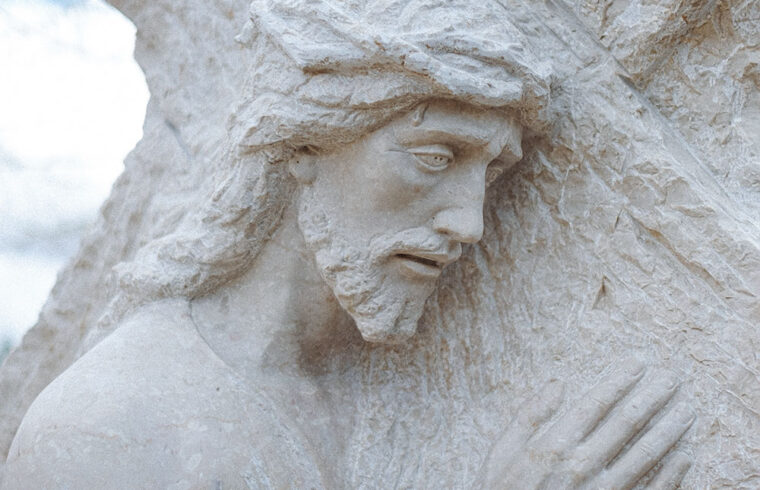
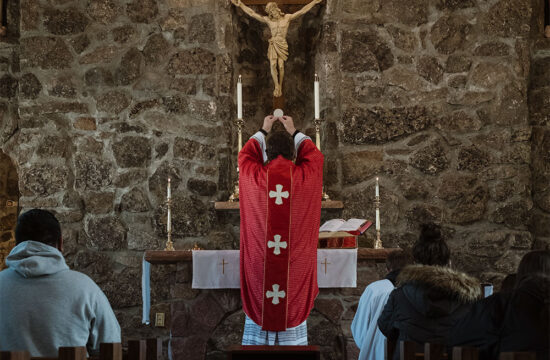



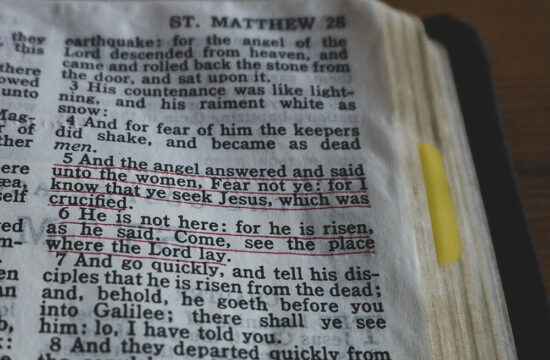


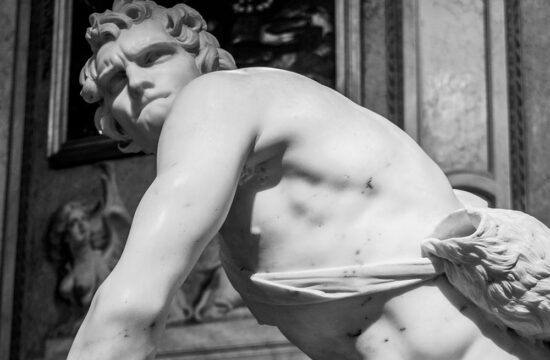
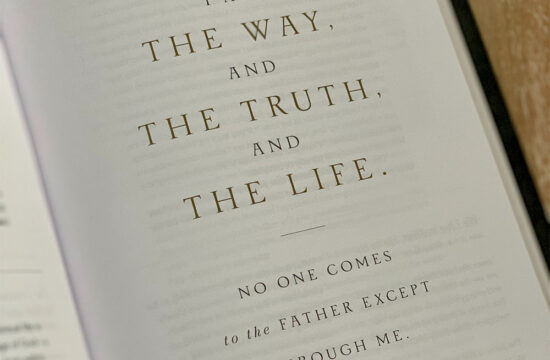

Is there any more posts after X? cannot find 160.
Thanks. Cindy Klein
Hi Cindy – my apologies – uploading them on here wasn’t as quick and easy as I thought, so I plan on posting the rest by the end of this week.
Cannot find Day 161. Could you please add. Thanks! LOVE YOUR POSTS and am passing them on to my Bible Study group!
CINDY! GREAT CATCH! Don’t know how I missed that! Thanks so much for sharing – glad that these have been of help. I just added day 161, just hit the refresh button and it should show up!